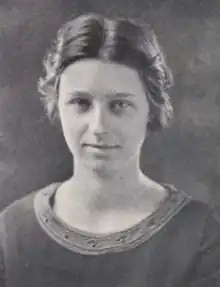Aline Huke Frink
Aline Huke Frink (March 2, 1904 – March 14, 2000) was an American mathematician, and a professor on the faculty of the Pennsylvania State University from 1930 to 1969.
Aline Huke Frink | |
|---|---|
 Aline Huke, from the 1924 Mount Holyoke College yearbook | |
| Born | March 2, 1904 Torrington, Connecticut |
| Died | March 14, 2000 Kennebunkport, Maine |
| Occupation | Mathematician |
| Spouse | Orrin Frink |
Early life and education
Aline Huke was born in Torrington, Connecticut[1] and raised in Massachusetts, the daughter of Allen Johnson Huke and Mary Evelyn Feustel Huke. Her father was a businessman,[2] and her mother was a schoolteacher.[3]
Huke earned a bachelor's degree in mathematics from Mount Holyoke College in 1924.[4] She trained as a teacher at the New York State Teachers' College in Albany, and completed a master's degree and doctorate at the University of Chicago.[5] Her doctoral advisor was Gilbert Ames Bliss, who oversaw her 1930 dissertation, "An Historical and Critical Study of the Fundamental Lemma in the Calculus of Variations".[6][7] She also studied with David Widder at Bryn Mawr College.
Career
Frink taught at a high school in Cobleskill, New York from 1924 to 1926. She taught mathematics at Mount Holyoke College from 1929 to 1930, and at the Pennsylvania State University, part time after she married and full-time after 1947, two years after her last child was born. She held the rank of assistant professor until 1952, associate professor until 1962, and became professor emeritus when she retired in 1969.[3][8]
In addition to her teaching, Frink translated a Russian-language mathematical text, Calculus of Variations by Naum Akhiezer, published in 1962.[3][9] Her mathematical research was published in Bulletin of the American Mathematical Society.[10] She was a charter member of the Women's Scientific Club at Penn State, along with Pauline Gracia Beery Mack, Mary Louisa Willard, and Teresa Cohen; the club became a chapter of Sigma Delta Epsilon (now Graduate Women in Science).[11]
Personal life
Aline Huke married fellow mathematician Orrin Frink in 1931. They had four children together. She was widowed when Orrin Frink died in 1988,[12] and she died in 2000, in Kennebunkport, Maine, aged 96 years.[3] Since 2006, there has been an endowed scholarship in Penn State's mathematics department, named for Aline Huke Frink and Orrin Frink.[13]
References
- American Men of Science: A Biographical Directory. Bowker. 1949. p. 838.
- "Allen J. Huke". Hartford Courant. 1956-10-05. p. 10. Retrieved 2021-06-25 – via Newspapers.com.
- Green, Judy; LaDuke, Jeanne (2009). Pioneering Women in American Mathematics: The Pre-1940 PhD's. American Mathematical Soc. pp. 177–178. ISBN 978-0-8218-4376-5.
- "Math faculty couple's son creates Trustee Matching Scholarship in their honor". Penn State News. 2006-05-03. Retrieved 2021-09-14.
- Duren, W. L. (1976). "Graduate Student at Chicago in the Twenties". The American Mathematical Monthly. 83 (4): 248. doi:10.2307/2318211. ISSN 0002-9890. JSTOR 2318211.
- "Aline Huke". The Mathematics Genealogy Project. Retrieved 2021-06-24.
- Huke, Aline (1930). An Historical and Critical Study of the Fundamental Lemma in the Calculus of Variations ... University of Chicago.
- "They Taught for 70 Yrs". Bucks County Courier Times. March 20, 1969. Retrieved June 24, 2021 – via NewspaperArchive.com.
- "Frink to Accompany Husband to Ireland". Daily Collegian. August 12, 1960. p. 5. Retrieved June 24, 2021 – via Newspapers.com.
- Frink, Aline H.; Frink, Orrin (August 1938). "Polygonal Variations". Bulletin of the American Mathematical Society. 44 (8): 538–547. doi:10.1090/S0002-9904-1938-06800-0.
- "Local Scientific Club Joins National Group". Penn State Collegian. January 24, 1936. p. 1. Retrieved June 24, 2021 – via NewspaperArchive.com.
- "Orrin Frink, Mathematician, 86". The New York Times. 1988-03-17. ISSN 0362-4331. Retrieved 2021-06-25.
- "Math faculty couple's son creates Trustee Matching Scholarship in their honor". Penn State News. May 3, 2006. Retrieved 2021-06-24.